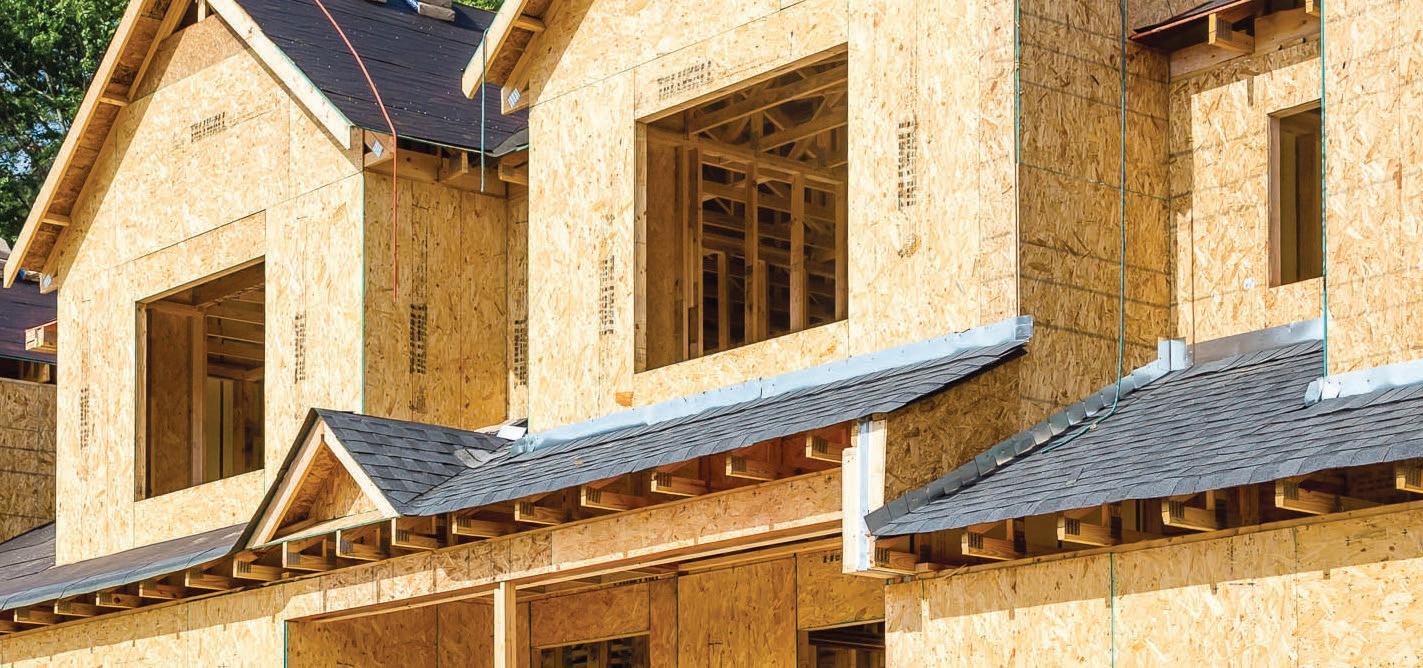Modern REAL ESTATE
A guide to
-The Modern Market
-Renovation Recommendations
-Tips for First-time Buyers
-Home Inspections and MORE!

A special section from



A guide to
-The Modern Market
-Renovation Recommendations
-Tips for First-time Buyers
-Home Inspections and MORE!

A special section from



for and ultimately purchasing a home can feel like a day at an amusement park. Much like a ride on a roller coaster, buying a home can be both exciting and a little scary, and those peaks and valleys have been even more profound in recent years, when the real estate market has been as tough as ever to navigate due to low inventory and high prices.
Though the real estate market changed significantly in recent years, some conventional home buying wisdom still holds true. The importance of mortgage preapproval is one such notion, and it’s even likely that being preapproved for a mortgage before making an offer on a home is more significant now than it was as recently as half a decade ago.
What is mortgage preapproval?
Mortgage preapproval essentially confirms to sellers and sellers’ agents that a given buyer has qualified for a mortgage they can use to purchase a property. In a competitive real estate market like the current one, mortgage preapproval can set buyers apart from the competition, increasing the likelihood that their offers will be accepted over ones submitted by buyers who have not been preapproved.
What is prequalification?
Some buyers may hear the term “prequalification” and assume it’s the same thing as preapproval. However, the lending experts at LendingTree report there is a notable distinction between the two terms. Prequalification is less formal and based on a casual conversation with a lender that may
or may not involve details about a buyer’s credit history, income, monthly expenditures, and other pertinent financial information.
Preapproval is a formal examination of a buyer’s finances and financial history that is conducted after documentation such as W-2s and bank statements are provided. A lender also will conduct a credit inquiry through three major credit bureaus during the preapproval process.
How do I get mortgage preapproval?
Mortgage preapproval is a simple process and it’s a service offered by most mortgage lenders. A simple phone call or email to a lender can get the process started, and it does not take long for a lender to decide if an applicant qualifies for preapproval. However, insufficient documentation or misleading information can slow down the preapproval process (and potentially cause a lender to deny an application), so prospective home buyers are encouraged to provide ample and honest documentation of their finances.
Does mortgage preapproval expire?
It can take buyers a long time to buy a home in a competitive market with low inventory. So it’s important that prospective buyers recognize mortgage preapproval has a shelf life of around 60 to 90 days. The preapproval letter a lender provides will indicate an expiration date for the preapproval. If that elate comes and goes without buyers purchasing a home, they will have to reapply for preapproval.
Must I borrow from the lender who preapproved me?
Buyers also should know that a mortgage preapproval does not bind them to the lender who preapprovecl them. Buyers can still shop around for a mortgage once they make an offer on a home.
Mortgage preapproval is a vital part of the home buying process and can be especially useful in a competitive real estate market.
Mortgage interest rates have been headlining financial news segments for several years running. Much of that news has been met with less than open arms, as rates have risen dramatically in recent years, an increase that is related to the ripple effect of the COVID-19 pandemic.
Mortgage interest rates did not immediately spike after the World Health Organization declared a global pandemic in March 2020. In fact, data from the lender Freddie Mac indicates mortgage rates were still well below 4 percent on January 1, 2022. However, those rates hovered around 7 percent by the end of that year, and were still around that level at the start of 2024. With such high interest rates, it’s understandable if prospective home buyers feel helpless. However, there’s much buyers can do to help themselves as they seek to secure the lowest mortgage interest rate possible.
• Read your credit report and improve your score, if necessary. Many prospective home buyers save up for years in anticipation of the day when they will purchase their own home. During this period, buyers can read their credit reports and address any discrepancies while taking steps to improve their credit scores. Lenders consider a host of variables to determine an applicant’s credit worthiness, and credit history and credit scores bear significant influence. The higher an applicant’s credit score, the more favorable mortgage rate he or she is likely to get.
• Take control of your debt-to-income ratio. Debt-to-income (DTI) ratio refers to what you owe in relation to how much you earn. The lower your DTI, the better you look to lenders. According to Bankrate, lenders typically want to avoid issuing mortgages to individuals if the monthly payment will exceed 28 percent of their gross monthly income, and people who may be near that
threshold for a given home may be denied a mortgage if their DTI is high. Prospective home buyers currently carrying significant debt, including consumer debt like credit cards and/ or student loan debts, should make a concerted effort to pay down that debt prior to applying for a mortgage. Prioritize paying off consumer debt before applying for a mortgage.

• Maintain a strong employment record. Steady employment and consistent earnings make mortgage applicants more attractive in the eyes of lenders. If you are currently shopping for a home or about to make an offer, now might not be the best time to switch jobs. Self-employed individuals and freelancers working multiple jobs can still qualify for a good mortgage rate, but they may need to provide more extensive documentation that indicates their earnings going back several years. Individuals who have been working full-time for the same company for years may only need to provide W-2 forms from the two most recent tax years.
Shop around for rates. Rates may not fluctuate much between lenders, but it’s still worth shopping around for mortgage rates. A study from Freddie Mac found that the benefits of shopping around for a mortgage rate were especially notable in 2022 compared to the decade prior, saving borrowers who took the time to shop for rates substantial sums of money. Mortgage rates remain high compared to a half decade ago, but prospective home buyers can take steps to increase their chances of qualifying for a favorable rate.





about buying your first home? Here is a quick guide for firsttime homebuyers, covering everything from financing options to closing the deal.
Before you start house hunting, it’s crucial to understand your financial situation. Calculate your budget by considering your income, debts and savings. Ideally, aim to have a down payment of at least 20 percent of the home’s price to avoid private mortgage insurance (PMI). Check your credit score and work on improving it if necessary, as a higher score can secure you better mortgage rates.
A mortgage pre-approval gives you a clear picture of how much you can afford to borrow and shows sellers that you are a serious buyer.
To get pre-approved, you’ll need to provide financial documents, including tax returns, pay stubs and bank statements. Shop around for lenders to find the best rates and terms.
A knowledgeable real estate agent can guide you through the buying process and help you find homes that meet your criteria.
Look for an agent with experience in your desired area and a strong track record of successful transactions. Ask for recommendations from friends and family or read online reviews.
Make a list of must-haves and nice-tohaves for your new home. Consider factors such as location, size, number of bedrooms and proximity to schools and work.
Attend open houses and schedule private showings to explore different properties. Don’t rush the process; finding the right home takes time. Making an
Once you’ve found a home you love, work with your real estate agent to make a competitive offer. Your agent will help you determine a fair price based on comparable properties in the area.
Be prepared to negotiate with the seller, and don’t be discouraged if your first offer isn’t accepted.
After your offer is accepted, schedule a home inspection to check for any potential issues with the property. If the inspection reveals significant problems, you may need to negotiate repairs or adjust your offer. Your lender will also require an appraisal to ensure the home’s value matches the loan amount.
The closing process involves finalizing your mortgage, signing paperwork and paying closing costs.
Before closing day, review all documents carefully and ask questions if anything is unclear. On closing day, you’ll sign the final paperwork, pay your down payment and closing costs,

and receive the keys to your new home.
Title Insurance: Title insurance is a policy that protects lenders and homebuyers from financial losses related to defects in a property's title, such as liens, encumbrances or ownership disputes. There are two types of title insurance: lender's title insurance, which protects the lender, and owner's title insurance, which protects the buyer. This insurance is typically purchased during the closing process.
A real estate agent can guide you through the buying or selling process, negotiate on your behalf, and provide valuable market insights. Choose an agent with a strong track record and local expertise to ensure a smooth and successful transaction.


When it comes to where to call home, cost is not the only consideration. Most people look at their lifestyle, work, amenities and more. The same considerations come into play when considering whether to rent or buy that home.
Typically, people associate renting
with temporary situations. And it’s true, renters are missing out on building equity in a property they own. However, renters are also not toting the costs of homeownership. The landlord is responsible for insurance, maintenance, repairs, taxes, fees and other costs.
Rent may cover some of it, but unexpected emergencies are typically not the renter’s responsibility.
While those costs transfer to your

bank account when you own the home, so does the ability to do whatever you want with it. Bright yellow walls? Done. Adding a pool?
Just a cashed check away. Plus, there’s all that equity you’re building, right?
Maybe not.
“We project that at a national level, home prices are likely to decline somewhere in the neighborhood of 5-10% from their peak, which we reached in the second quarter of 2022,” Moody’s Deputy Chief Economist Cristian deRitis told Fortune. That means a buyer could have paid more for the home than it’s now worth.
In the end, it comes down to what works best for you, your family, your budget and your lifestyle.
• How handy are you? Renters are not typically responsible for fixing plumbing issues, painting, replacing roofs and those types of things; the landlord is legally required to maintain the property. So if you

a k Youfor Your st andSupport!
anttoexpress my feltgratitude to my ts for their business confidence in me. been aprivilege to with you, &Ilook wardtocontinuing lp you achieveyour oals in 2025.



want to enjoy home ownership without the hassle of maintenance, renting could be a way to do so.
• How long are you staying?
Home ownership may be a good fit if you like where you are and are ready to settle in for at least three to five years, keeping roughly the same lifestyle and budget that you have now. However, if you have your eye on living somewhere else or aren’t ready to put down roots, you may want the flexibility renting allows.
• How financially stable are you?
Renting requires a deposit, good credit and making payments on time, but the insurance requirements and maintenance needs are much less than home ownership.
Buying a house, on the other hand, requires dipping heavily into your bank account. You’ll need a down payment, good credit, plus an emergency fund to pay for unexpected expenses. Examine your budget, possibly with a financial advisor, to see what would be the best move for your financial health.











































Discrimination in renting or buying a home because of race, color, national origin, religion, sex, familial status or disability is prohibited by the Fair Housing Act.
notices, statements or advertisements that indicates any preference, limitation or discrimination.
• Imposing different sale prices or rental charges.
• Using different qualification criteria or applications, sale or rental standards or procedures, or other requirements.
• Evicting a tenant or tenant’s guest.
• Failing to perform or delaying maintenance or repairs.

The law covers most housing, with additional protections for federally assisted housing.
The Fair Housing Act was enacted in 1968 in the wake of the assassination of Rev. Dr. Martin Luther King Jr. President Lyndon Johnson saw the act as a fitting memorial to King’s life and work.
The Fair Housing Act makes it illegal for any of these actions because of the conditions listed above:
• Refusing to rent or sell housing.
• Refusing to negotiate for housing.
• Otherwise making housing unavailable.
• Setting different terms, conditions or privileges for sale or rental.
• Providing a person different services or facilities.
• Lying about housing’s availability for inspection, sale or rental.
• Making, printing or publishing

• Limiting privileges, services or facilities.
• Discouraging the purchase or rental of housing.
• Assigning a person to a particular building, neighborhood or section.
• Persuading or trying to persuade homeowners to sell their homes by suggesting people with a protected characteristic are about to move into the neighborhood.
• Refusing to provide homeowners insurance to someone in a protected class or discriminating in the terms or conditions of the insurance.
• Denying access to or membership in any multiple listing service or real estate brokers’ organization.
• Refusing to make a mortgage loan or provide other financial assistance for housing.
• Refusing to provide information regarding loans.
• Imposing different terms or conditions on loans.
• Discriminating in appraisal.
• Conditioning the availability of a loan on a person’s response to harassment.
• Refusing to purchase a loan.
It’s also illegal to threaten, intimidate or otherwise interfere with someone exercising a fair housing right or helping others to exercise their fair housing rights, or to retaliate against someone who has filed a fair housing complaint or assisted in an investigation.
Home buyers must confront a host of variables in the best of times, but in recent years buyers have been forced to contend with a real estate market marked by a significant increase in home prices. According to the Federal Reserve Bank of St. Louis, the median home sales price in the third quarter of 2023 was $431,000. That marks a significant increase since the start of 2020, when the median sales price was $329,000. That 31 percent increase in a little less than four full years can be traced to a host of variables, not the least of which is the global COVID-19 pandemic, which officially earned that designation in early March 2020. But the rise in home prices is not as recent a phenomenon as some may think. In fact, data from the Federal Reserve Bank of St. Louis indicates the median home sales price rose by 576 percent between 1980 and the third quarter of 2023.



















Despite higher mortgage rates and a somewhat lower enthusiasm for buyers, residential construction is predicted to stay strong.
That’s because, along with those higher interest rates, there’s a lower inventory of homes for sale as existing homeowners cling to their lower rates.
Builders are ramping up construction in response and sprinkling in incentives to help make higher rates more palatable to buyers, such as help with closing costs or buying down rates. Ali Wolf, chief economist with the housing firm Zonda, says builders report their most popular incentive is buying down mortgage rates. Other popular incentives are covering up to $20,000
in closing costs or offering free upgrades.
That makes new homes look more affordable to anxious buyers.
“It’s very important to address buyers’ fear and those who are nervous where prices are,” Wolf says. “To get them to feel more comfortable, they need to at least feel like they’re getting a deal.”
The incentives paired with the tighter market boosted the new home market up to as much as 30% of the single-family home market, well above traditional averages of 10-12%.
“The shortage of existing homes for sale has opened up the possibility of new home construction to more buyers who may not have once considered it,” says Danielle Hale, Realtor.com’s chief economist.
Buyers are also seeing new homes as a safer bet, with 40% of buyers saying the top reason they purchased a new home
was to avoid renovations or problems, followed by a lack of inventory and the ability to customize their home’s design. The National Association of
Realtors expects single-family housing starts to increase 4.2% in 2025, and experts say builders need to do more.
“We need to build more than 1.15 million single-family homes a year to reduce the nation’s housing deficit,” Robert Dietz, chief economist at the National Association of Home Builders, told the NAR.
Builders say they’re facing headwinds such as higher prices, supply chain issues and rising regulatory costs, but they remain optimistic. The NAR says 80% of builders anticipate starting new homes in 2024 and 51% expect starts to increase more than 10% over 2023.























You can reduce your carbon footprint while making your home more comfortable and, just
maybe, fattening your wallet.

Here are some projects from The Spruce that can improve the sustainability of home sweet home.
Choosing Renovation
Sam Lund, CEO and creative director of organization and design firm Simply Sam, says choosing to renovate rather than build anew is a sustainable decision all on its own.
“We believe that making something old feel new again is a lot greener than throwing up a bunch of new homes,” Lund told The Spruce. “We typically use a larger remodel to make things more efficient. The best thing would be updating everything in an old house all at once, but that’s typically not attainable for the average family.”
Upgrade Insulation
It’s hidden, but you’ll definitely feel a difference. Insulation can help reduce heating and cooling costs and make your home more comfortable. Your utility company may offer grants or bill reductions to help cover some of the cost.
Install New Windows
Loose, old or weak windows are one of the biggest culprits when it comes to energy loss in the home,
The Spruce says. Energy-efficient windows can decrease the amount of energy your home needs to keep it comfortable.
Install Low-Flow Plumbing
Reduce water usage by opting for energy-efficient showers, toilets and faucets that use less water. Low-flow toilets, for example, use just 1.6 gallons of water while standard toilets can use up to 7 gallons of water per flush.
Add Solar Panels
Installing solar panels costs a lot of money upfront, but depending on where you live and how much energy you use, it could be worth it. Plus, there may be tax incentives, grants and other help to pay for the expense.
Not all renovation projects include a way to put in a more efficient appliance or add insulation to the home, but most of them provide an opportunity to use materials with a low environmental impact. Try to opt for recycled and bio-based materials that are better for the environment, reusing materials when you can and recycling what you can’t reuse.







Purchasing a home is a significant investment, and a crucial step in the process is the home inspection. A comprehensive home inspection report provides valuable insights into the condition of the property, helping buyers make informed decisions.
Home inspection reports are detailed documents that outline the findings of a professional inspection of a property. The report typically covers various aspects of the home, including the structural integrity, electrical systems, plumbing, roofing and more. Buyers should approach these reports with a keen eye and a basic understanding of the terminology used.
Nick Gromicko, founder of the International Association of Certified Home Inspectors, told Bankrate that a home inspection report is the chance to learn about any problems and will usually include explanations and
photos of any problems found.
“Your inspection report is going to be quite thorough, covering a wide range of systems and components in the home,” Gromicko said.
Start by identifying any major issues that could pose significant problems or safety concerns. These may include structural issues, electrical problems, plumbing issues or issues with the roof. These are critical factors that may affect the habitability of the home and should be addressed promptly.
minor concerns that can be easily addressed and major issues that may require extensive repairs. A leaky faucet or a loose doorknob is not as critical as a faulty electrical system or a compromised foundation.

Once the buyer has a clear understanding of the inspection report, the next step is to navigate the negotiation process with the seller. This phase involves discussing repairs, potential credits or a possible reduction in the sale price based on the identified issues.
basis of your negotiation strategy. Buyers have the option to request that the seller address specific issues before the closing or provide a credit for the estimated cost of repairs. The negotiation process involves finding a fair and reasonable solution that satisfies both parties. Sellers may agree to complete the repairs, offer a credit or adjust the sale price accordingly. The inspection report won’t tell you how much it will cost to make repairs or fix identified problems. It’s something you will want to research before negotiating. There are services such as Repair Pricer that will translate an inspection report into an itemized list of prices.
Some major red flags to watch for include water intrusion, previous storm damage, pest infestation and electrical issues.
Not every issue flagged in a home inspection report is a deal-breaker. Buyers should differentiate between
Work with your real estate agent to prioritize essential repairs. Consider bringing in a real estate attorney at this point as well. Focus on issues that could affect the safety, structural integrity or overall functionality of the home. These priorities will form the
Negotiations are a two-way street. Be open to compromise and consider the seller’s perspective. In some cases, sellers may not have the financial means to address all the requested repairs. Finding a middle ground that ensures the home is in an acceptable condition for the buyer while being fair to the seller is key.


Smoky Mountain Realty is aWoman OwnedBusinesssince 2010 with multimilliondollarproducersand over 200 combined years of experience.Thereare no hidden fees andSmoky Mountain Realty has an agentoncall 24/7 foryourReal Estate needs.

TonyaBledsoe
865-643-0644

865-254-3675



























